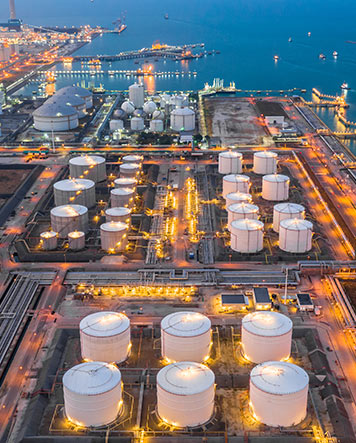PLCs and DCSs in Oil and Gas: Automation for Safety, Efficiency, and Reliability Across the Value Chain
Introduction
The oil and gas industry encompasses a vast and complex network of operations, from exploration and production (upstream) to transportation (midstream) and refining (downstream). Safety, efficiency, reliability, and environmental protection are paramount concerns throughout the entire value chain. Programmable Logic Controllers (PLCs) and Distributed Control Systems (DCSs) are indispensable automation technologies that play critical roles in managing and optimizing these processes, often in remote, harsh, and hazardous environments.
PLC Applications in Oil and Gas
PLCs are widely used for discrete control, managing individual equipment, and handling specific tasks within various oil and gas operations:
- Wellhead Control: PLCs control wellhead valves, pumps, and safety systems, managing the flow of oil and gas from wells.
- Artificial Lift Systems: PLCs control artificial lift systems, such as electric submersible pumps (ESPs), rod pumps, and gas lift systems, which enhance oil production from wells.
- Separators: PLCs control separators, which separate oil, gas, and water from the well stream.
- Compressors and Pumps: PLCs control compressors and pumps used for boosting pressure, transporting fluids, and injecting chemicals.
- Metering Systems: PLCs control metering systems, which measure the flow of oil and gas.
- Emergency Shutdown Systems (ESD): PLCs are a critical component of ESD systems, which automatically shut down equipment in the event of an emergency.
- Fire and Gas Detection Systems: PLCs monitor fire and gas detectors and initiate alarms or suppression systems.
- Pipeline Monitoring (Leak Detection): PLCs are used in pipeline monitoring systems to detect leaks and other anomalies.
- Remote Terminal Units (RTUs): PLCs often function as RTUs, collecting data from remote sites and transmitting it to a central control system.
DCS Applications in Oil and Gas
DCSs are employed for continuous process control, plant-wide integration, and overall system management in larger oil and gas facilities:
- Offshore Platforms: DCSs control the entire operation of offshore platforms, including drilling, production, processing, and utilities.
- Onshore Processing Plants: DCSs control onshore processing plants, which separate, treat, and process oil and gas.
- Refineries: DCSs control the complex processes within refineries, which convert crude oil into various products, such as gasoline, diesel, and jet fuel.
- Gas Plants: DCSs control gas plants, which process natural gas to remove impurities and separate it into different components.
- Pipeline Control: DCSs manage the operation of long-distance pipelines, controlling pressure, flow, and leak detection.
- LNG Plants: DCSs control the liquefaction and regasification processes in LNG plants.
- Tank Farms: DCSs manage the storage and transfer of oil and gas in tank farms.
- Safety Instrumented Systems (SIS): DCSs often incorporate SIS, which provide a higher level of safety than standard control systems.
- Advanced Process Control (APC): DCSs often incorporate APC techniques, such as model predictive control (MPC), to optimize process performance and improve product quality.
- Alarm Management: DCSs provide sophisticated alarm management capabilities to alert operators to abnormal conditions and prevent incidents.
- Environmental Monitoring and Reporting: DCSs monitor and record emissions, ensuring compliance with environmental regulations.
Hybrid Systems and Integration (PLCs and DCSs)
The oil and gas industry extensively utilizes hybrid systems, combining the strengths of PLCs and DCSs:
- PLC for Local Control: PLCs handle the fast, discrete control of individual equipment, such as wellheads, pumps, and compressors.
- DCS for Overall Coordination: The DCS oversees the entire operation, manages complex processes, and provides a unified platform for monitoring and control.
- Data Exchange and Communication: PLCs and DCSs communicate with each other, exchanging data and coordinating operations. This is critical for seamless operation and optimization.
- SCADA Integration: Both PLCs and DCSs are often integrated with Supervisory Control and Data Acquisition (SCADA) systems, which provide remote monitoring and control of geographically dispersed assets.
- MES/ERP Integration: PLCs and DCSs can be integrated with Manufacturing Execution Systems (MES) and Enterprise Resource Planning (ERP) systems. This provides real-time data for production planning, scheduling, maintenance management, and cost accounting.
Benefits of PLCs and DCSs in Oil and Gas
- Enhanced Safety: Automation reduces the risk of human error and improves workplace safety in hazardous environments.
- Increased Efficiency: Automation optimizes production, reduces downtime, and improves overall efficiency.
- Reduced Operating Costs: Automation reduces labor costs, energy consumption, and maintenance expenses.
- Improved Reliability: Redundant systems and robust designs ensure high availability and minimize disruptions.
- Environmental Protection: DCSs help to minimize emissions, prevent spills, and ensure compliance with environmental regulations.
- Remote Monitoring and Control: SCADA integration enables remote operation and management of assets, reducing the need for personnel in remote or hazardous locations.
- Data-Driven Decision Making: Real-time data from PLCs and DCSs provides valuable insights for process optimization, predictive maintenance, and continuous improvement.
- Scalability and Flexibility: PLC and DCS systems can be easily scaled and adapted to accommodate changes in production requirements or new field development.
Conclusion
PLCs and DCSs are essential technologies for the modern oil and gas industry. They provide the automation, control, and integration capabilities needed to manage complex operations, ensure safety, improve efficiency, and meet stringent environmental requirements across the entire value chain. The trend towards hybrid systems, remote operation, advanced process control, and greater integration with SCADA/MES/ERP will continue to drive innovation and optimization in the oil and gas industry, ensuring the safe, reliable, and efficient production and delivery of energy resources. The harsh environments, remote locations, and safety-critical nature of many oil and gas operations make the reliability and robustness of PLC and DCS systems absolutely paramount.
 中文版
中文版






